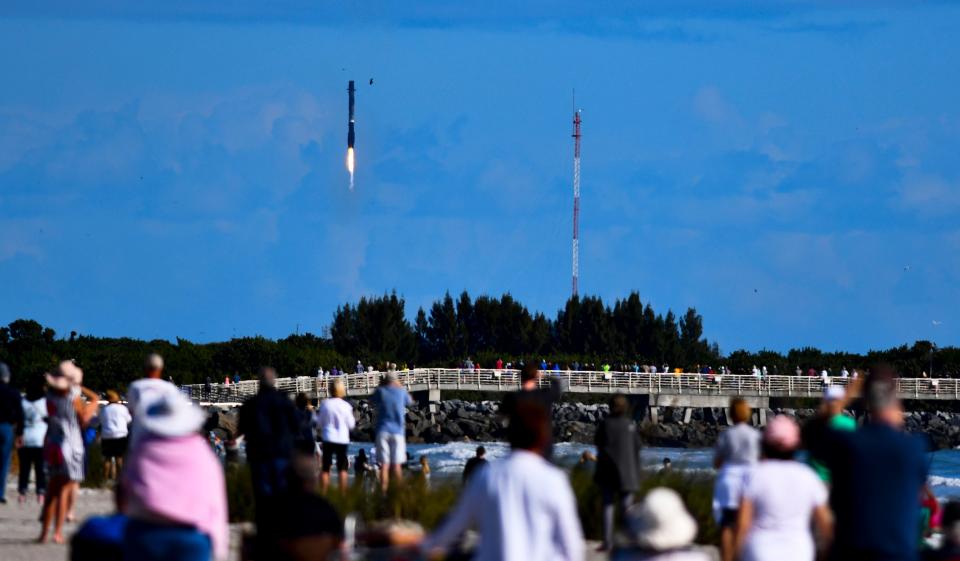SpaceX targeting second booster landing at Cape Canaveral, but weather downgraded
Space Force calculations show a downgraded forecast for SpaceX's next launch from Cape Canaveral on Thursday, a mission that will include sonic booms as the Falcon 9 booster returns to the Space Coast for landing.
Space Launch Delta 45 officials said the gloomy, rainy disturbance lingering over the Space Coast this week is to blame but could begin to clear before the liftoff window at 6:11 p.m. EST Thursday. The latest forecast dropped the "percent go" probability at Launch Complex 40 to 60%, a slight downgrade from the previous version.
"While deep moisture through the atmosphere gradually gets stripped away tonight into tomorrow, the proximity of this system coupled with robust onshore flow will still support scattered low-topped showers moving towards the coast on Thursday," forecasters said Thursday.
The primary concerns, they said, are "lingering cumulus clouds and showers embedded in this low-level onshore flow as well as breezy conditions during liftoff."
Liftoff: From NASA to SpaceX, these are the top Florida launches to look forward to in 2022
The dark side of the moon: Part of one of Elon Musk's SpaceX rockets is expected to collide with the moon in March
Forecasters did add a note, however, about the return of the Falcon 9 rocket's booster to Cape Canaveral's Landing Zone 1: landing conditions were downgraded from "low risk" to "moderate risk."
This would mark the second landing of a 162-foot Falcon 9 first stage at Cape Canaveral this month, a maneuver that generates sonic booms heard across Central Florida depending on weather conditions. Residents should be prepared for the booms as they can be startling, but are generally harmless.
Secured in the payload fairing will be COSMO-SkyMed 2, or CSG-2, an Italian Space Agency Earth satellite that will scan Earth's surface for both civilian and military purposes. Falcon 9 will fly south and deliver CSG-2 to a polar orbit some 385 miles above.
CSG-2 marks SpaceX's fourth launch of the month, all of which have been polar, and second to feature a local landing. Including United Launch Alliance, the Space Coast will have hosted five missions so far, a breakneck cadence for the Cape and KSC.
What is Starlink?: Inside the satellite business that could make Elon Musk a trillionaire.
NASA's successful arrival: The James Webb Space Telescope reaches new home a million miles from Earth

One more launch is on the schedule for this month, assuming CSG-2 can stick to schedule: SpaceX's next batch of Starlink satellites is slated to launch from Kennedy Space Center no earlier than 3 p.m. on Saturday, Jan. 29. The debut of a small rocket by startup company Astra has not yet been solidly scheduled, though it was targeting late this month.
For the latest, visit floridatoday.com/launchschedule.
Contact Emre Kelly at aekelly@floridatoday.com or 321-242-3715. Follow him on Twitter, Facebook and Instagram at @EmreKelly.
Rocket launch on Thursday, Jan. 27
Rocket: SpaceX Falcon 9
Mission: COSMO-SkyMed Earth observation satellite
Launch Time: 6:11 p.m. EST
Launch Window: To 6:17 p.m. EST
Trajectory: Southeast
Landing: Landing Zone 1
Weather: 60% "go"
Visit floridatoday.com/space at 4:30 p.m. EST Thursday, Jan. 27, for live updates and video.
This article originally appeared on Florida Today: Weather downgraded as SpaceX targets another Florida booster landing

